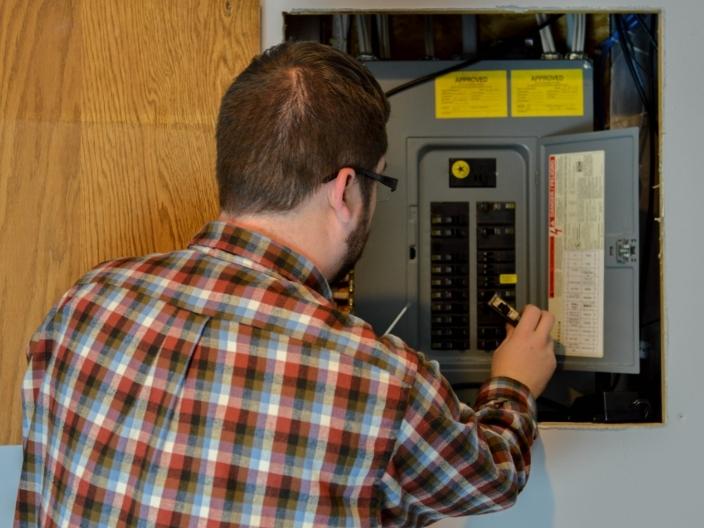
A good handyman goes a long way for renovation, home improvement, and more beyond that; if you’re looking to start a handyman or general contractor business, you can be sure you’ll have potential clients waiting for you.
First, though, one crucial question bears answering: What type of work can a handyman do legally?
A handyman can provide small home repairs and basic renovation and maintenance services. Repairing drywall, flooring, doors, or decks is usually allowed. Interior and exterior cleaning services, landscaping, smart home device setup, or fixing basic leaks are also commonly permitted.
Handymen and general contractors don’t truly have free rein to take on any task given to them but are obligated to meet state and local laws concerning their work. While many details vary from one jurisdiction to another, there are enough commonalities that you can count on anywhere you set up your business.
Here is a general guide on the jobs a handyman can perform and some high-level information on the relevant laws and restrictions they must follow. Please check with your local jurisdiction to be sure you know what applies in your area.
Disclaimer: This article is not legal advice. You should consult your local building regulations and a qualified attorney for legal advice.
Renovation and Maintenance: What Is a Handyman Allowed to Do?
Some of the most common services that handymen provide pertain to repairing, renovating, or touching up parts of a client’s house. Below is a list of the types of work a handyman often undertakes.
This is a very broad subset, and for the most part, nothing here requires a general contractor’s license to perform, though that may not be the case in your state or you may need a handyman’s license of some sort.
Some common repair jobs include:
1. Drywall Repair
Dents, cracks, or holes in drywall are commonplace as a home is lived in, especially with children or a large family. Fortunately, just about any handyman knows how to patch up drywall and leave it looking good as new. While a simple task in itself, many homeowners nonetheless turn to handymen to do it because the key is to do it such that it’s not obvious that repairs had to be made.
2. Door Repair
Naturally, doors see a lot of wear and tear, and it’s far from uncommon to see the hinges or knob go bad, whether they become loose or start getting stuck. Handymen can often repair the door while it’s still in place. Otherwise, they can remove and rehang the door or help install a replacement.
3. Floor Repair and Renewal
Frequent traffic scratches and scuffs flooring and render carpets threadbare. While replacements are possible, this can be expensive, not to mention impractical if the damage is limited to a small area. Depending on the type of flooring, a handyman can fix or refinish the problem area before it becomes serious enough that a homeowner has no choice but to replace it.
4. Deck Repair
Decks and patios, as they’re exposed to the elements, require regular maintenance over time or after incidents like heavy weather. Handymen can repair loosened or broken railings, deck boards, bricks, tiles, and more. Additionally, many handymen perform staining, painting, and finishing on wooden decks or can be called on for power-washing.
5. General Maintenance and Touch-Ups
Plenty of maintenance work, whether inside the home or on its exterior, can be taken care of by a handyman, requiring no special licensing at all. Handymen can be hired to, for instance:
- Clean gutters
- Paint walls and trim work
- Move and assemble furniture or shelves
- Mow lawns and tend gardens
- Apply caulk
- Remove old grout
While these tasks are potential DIY projects for homeowners, many people are also busy with their everyday lives and can use a helping hand. Some clients — elderly or disabled people, for instance — also may struggle with these tasks for physical reasons, and they would benefit greatly from hiring a handyman.
What Can’t a Handyman Do Here?
Broadly speaking, handymen are not allowed to take on greater-scale renovation projects. Generally speaking, anything that changes a house’s layout or structure is typically outside of a handyman’s purview.
Your business will likely not be equipped or licensed to tear down walls or put up new ones. Similarly, while a handyman might patch up leaks, widespread roofing work is better left to roofing professionals. Attempting greater tasks such as these without certification or licensing can be dangerous or leave you liable in case of a lawsuit.
Recommended: How Much Work Can You Do Without a Contractor License?
Electrical Work: What is a Handyman Allowed to Do?
A master electrician isn’t always needed when something’s wrong with appliances in your home. A licensed handyman or general contractor can be called on for some simpler electrical tasks that don’t require full certification, such as the following.
1. Setting Up Smart Home Devices or Appliances
Smart devices and appliances are increasingly common in American homes. While they provide convenience in everyday life, they’re not always the most convenient to set up.
Mounting a smart thermostat or a video doorbell is something a handyman may be able to assist with. Some also go a step further and help connect the devices to the rest of the home’s network, as this doesn’t always require detailed electrical work.
2. Basic HVAC Maintenance
As the weather changes, homeowners want to be sure their HVAC units are functional and not receive an unpleasant surprise just as summer or winter enters in full stride.
In-depth repairs call for specialized help from licensed technicians. However, handymen are often able to perform regular maintenance duties, like changing filters or cleaning ducts, to make sure homeowners can count on their heating or cooling when it matters most.
What Can’t a Handyman Do Here?
Most jurisdictions forbid any handyman who is not a licensed and professional electrician from performing any work connected directly to a home’s electrical system. This can include replacing outlets, repairing outdated wiring, installing or repairing electrical boxes, and rewiring interior light fixtures. Some states go further and forbid handymen from attempting HVAC repairs of any sort.
Related: Electrical Contractor License Requirements by State
Such projects require more extensive knowledge and experience than what the average handyman possesses, not to mention a license and access to the right equipment. The risks presented by nonprofessional work here can be severe for both the home and business, up to and including electrical fires and death or injury by electrocution. Unless your contractor company specializes in electrical work, you shouldn’t answer these calls.
Plumbing: What Is a Handyman Allowed to Do?
A home’s plumbing system is easy to take for granted up until something goes wrong. This doesn’t always take the form of a ruptured septic tank or flooded basement, though. Sometimes the matter is smaller, such as a leaky pipe that needs locating. Clients can save by turning to a handyman instead of a fully certified plumber in some of these cases.
1. Plumbing Leaks
Many homeowners are familiar with leaky pipes and know they can become more than a mere nuisance. Getting to the source of the problem isn’t always easy, though, and repairing it can be more difficult still for the layperson.
Clients faced with minor leaks may seek a handyman to inspect and, if possible, repair leaks under showers, sinks, toilets, refrigerators, washing machines, etc. For anything short of severe damage, this saves the trouble of calling in a professional plumber.
2. Installing Fixtures
Many jurisdictions rule that handymen can install new plumbing fixtures or replace extant ones. Whether this holds depends on the state in question and what kind of fixtures are being worked with. Generally, though, a homeowner can count on a handyman to help with installing a replacement faucet, showerhead, or sink.
A licensed handyman can also be hired for installing a new washing machine and ensuring it’s properly connected to the waterline.
What Can’t a Handyman Do Here?
Major plumbing jobs are out of the question for a handyman or even a general contractor. As a rule of thumb, anything that requires extensive replacement of water lines is not within the legal territory of a handyman.
Related: Plumbing License Requirements By State
This also includes most tasks that interface with the sewer line or septic tanks. Besides being messy work, it can be a health hazard for residents and workers if done wrong. Clients are better off seeking a specialized contractor for this, and you should refrain from taking on the project as a handyman.
License to Work
Many home improvement tasks don’t require extensive specialized knowledge to complete. For these, you need little more than the right tools and the capacity to follow instructions, and on-job experience constitutes enough knowledge to qualify for the work.
However, other projects are more elaborate and can present risks to the worker or the household if mistakes are made. For this reason, most states have some legal guidelines on what types of work a license is necessary for.
Related: General Contractor License Requirements
This doesn’t necessarily mean a specialist license like a professional plumber or electrician. In many states, a ‘general contractor’ license exists, whether by that name or a different term. Having such a license, though, greatly broadens the jobs legally available to your business.
Handymen Versus Contractors
Oftentimes, the terms handyman and contractor are used somewhat interchangeably for people who are hired for home improvement, repair, and installation jobs.
When the terms are held to be distinct, typically a handyman is a sole proprietor who performs small home repairs and improvements. A contractor takes on bigger projects and usually oversees the work, meets with clients, and manages the workers and equipment required.
The degree of licensure required varies between the two as well. Sometimes, “handyman” is used to refer to someone with little specialized expertise and/or no licensing of any sort. While unlicensed handymen do exist, more often the term describes a licensed worker who possesses a more generalized body of expertise.
These workers perform jobs ranging from tiling and caulking in the kitchen and bathrooms to cleaning and painting walls. Typically, handymen take on exclusively residential jobs, as commercial buildings or their owners may require more advanced certification to do renovation work.
Why You Should Get Licensed
Unlicensed handymen and contractors often draw in clients with lower prices. However, unlicensed businesses also aren’t certified for having all the technical experience and legal knowledge necessary. This puts a technical and legal limit on the projects they can undertake, especially when the project has to be approved in an audit from a third party for compliance with building codes.
Also, unlicensed workers often don’t have insurance in case of mistakes or accidents during the project, and homeowner’s insurance may not cover any resulting damage from an unlicensed handyman’s work. Even if you are an unlicensed handyman, it is usually a good idea to have commercial insurance.
Recommended: Handyman License Requirements: State-by-State Directory
Savvy homeowners and clients know the risks and will take their business elsewhere if they learn that a contractor they were considering doesn’t have a license. If you take the time to acquire licensure for your business, you’re not only protecting yourself from legal repercussions, but you’re also investing in a stronger reputation for your company.
Learning More About Contractor Regulations
The nature of residential work requires you to know very well where you stand legally, in terms of what kind of work you’re permitted to do. This is the case whether you’re a handyman or a contractor, so before you open up your business you need to make sure you’re up to speed on legal requirements that apply to you.
Consult both state and city legislation in the region where your business will operate. Other general contractors in your area should also know what is required.
At the barest minimum, you will be required to hold proof of insurance before you can take the exam for licensure.
Depending on the type and breadth of work you wish to take on and where you reside, you also need to demonstrate sufficient experience, complete training courses and register with the local contractors’ board and/or state department of labor.
For some forms of contract work — predominantly, those within more specialized fields like electrical or plumbing — you also must go through an apprenticeship program before the license exam.
Final Thoughts
Know what kinds of projects you’re able to take and which you are barred from, especially as a handyman. In many states, the monetary value of a project is a limiting factor on whether or not a handyman can legally work on it without having a general contractor license. This applies even if the technical depth of the work is not outside a handyman’s legal domain.
The answer to “what type of work can a handyman do legally?” varies in detail between states and cities. However, to summarize, many inexpensive projects that don’t dramatically change a home’s floor plan or engage with critical electrical and water lines are within your rights if you have at least the basic handyman or general contractor license. So as long as you follow your state’s guidelines, you should be able to start or expand your handyman business.



